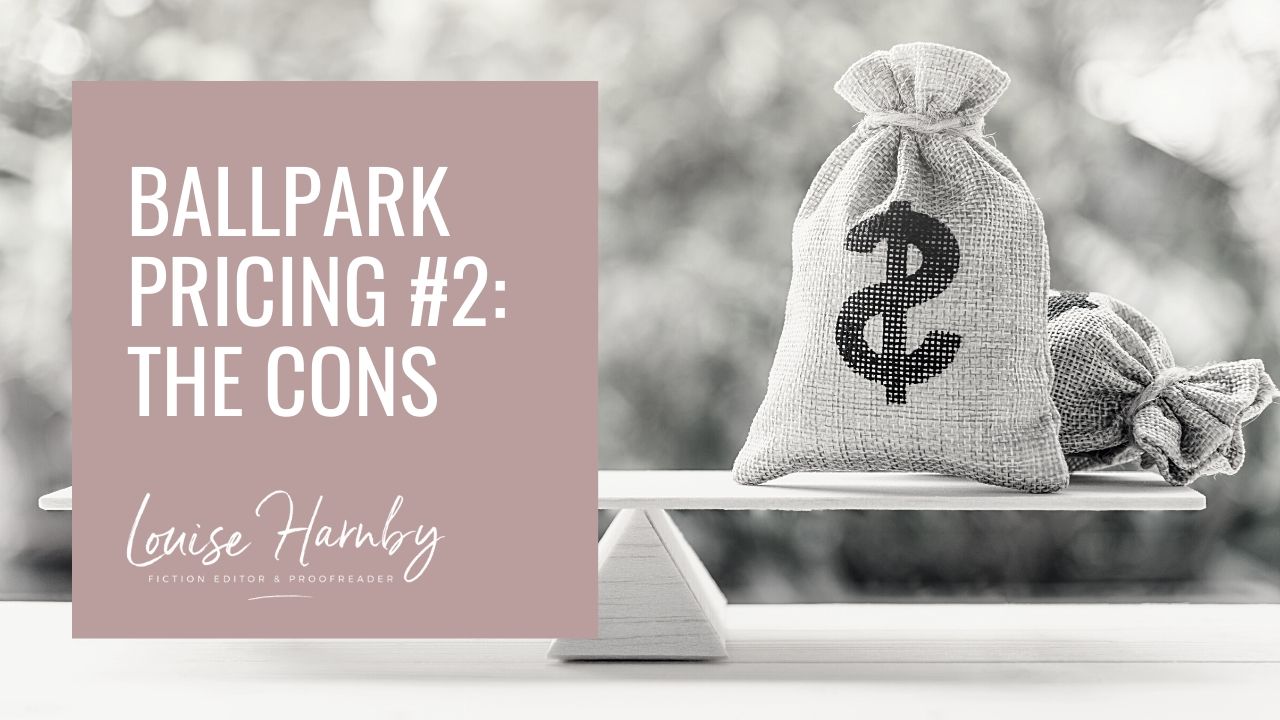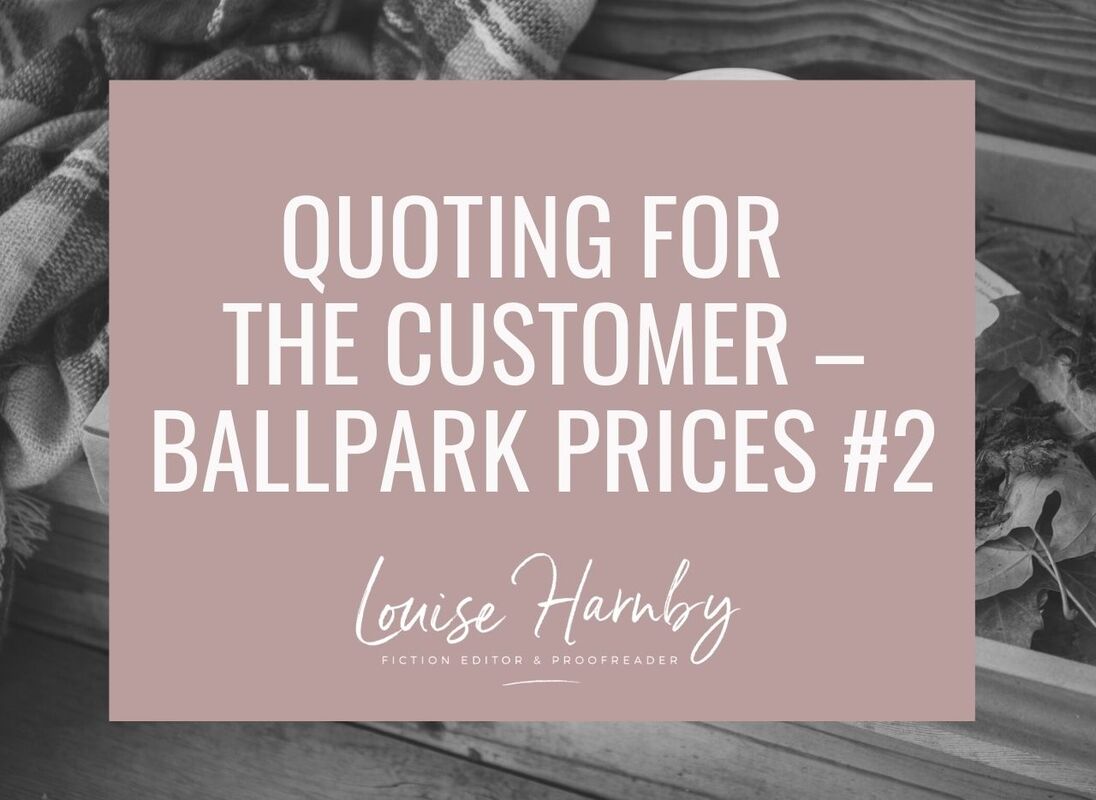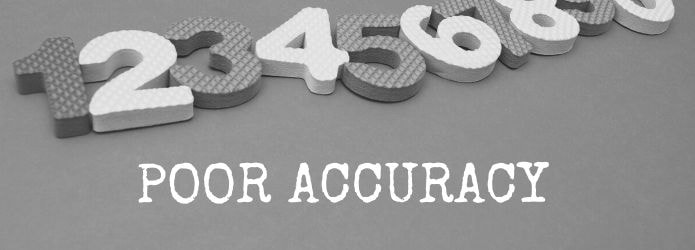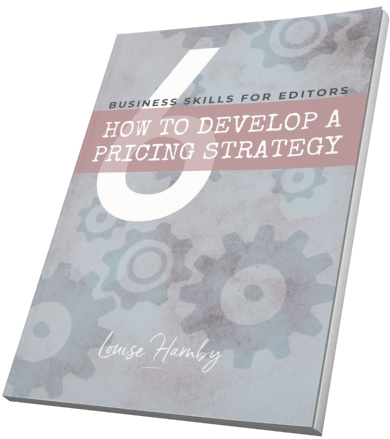|
This post explores the disadvantages of ballpark pricing for editors and proofreaders.
Part 1 discussed the advantages of ballpark pricing. There are, however, some valid concerns about the ballpark quotation that need to be considered before rushing into offering such a service. Disadvantage 1: Wrong focus – money over value … The argument goes that ballpark quotes focus on the money rather than the value that editorial professionals bring to the table. When we offer ballpark quotes, it’s just a figure. Says Celine Roque: ‘It’s incomplete. Your quote is just a number. Your clients can’t surmise all the information they need from that number. Apart from the primary services you provide, you should also give them your advice. Oftentimes, what a client really needs is different from what they think they need. In this case, an assessment of a client’s business and project, followed by a proposal, is the better approach’ (‘Why You Shouldn't Just Give a Quote to Potential Clients’, Gigaom, 2008). Regarding Roque’s concerns, giving advice takes time (see Part 1). Furthermore, what a client needs is not always the same thing as what a client wants. Giving advice to someone who actually just wants a price isn’t good customer service (even if we know that our advice, value, etc. would, in reality, be in their best interests). It’s just aggravating. There are ways to give advice that aren't invasive:
Disadvantage 2: Missing the opportunity to add value …
In ‘Sales 101: Don’t Get to Price Too Early, Even If You’re Asked to “Ballpark”’ (Sexton Group Ltd, 2015), Steve Payne discusses ‘the number one rule of quoting prices’: ‘Don’t quote a price – any price – before you have sold the client on your ability to do the job. If you haven’t convinced the client that it’s you they want to work with, before you quote a price, it’s like you are swinging at a baseball too early. In the case above, you made no effort to tell the client, through testimonials, through photographs, through stories, about your firm. How it operates. What makes it different. How delighted past customers have been with your work. How you have many repeat clients who will never work with another contractor as long as you are in business.’ In other words, you’re potentially shutting the door to negotiation, especially if your price is perceived as too high. Payne’s point about using value to make you a more hireable prospect is excellent, but I still believe that when a potential client asks for a price, we need to listen to that request and act on it. No one wants to hire an editor who can’t follow a brief. If we can’t listen to a client’s request at the very first point of contact, how can we expect them to trust us to listen further down the line? To ameliorate this, consider other ways in which you emphasize your value at the point where clients are likely to contact you.
Disadvantage 3: Poor accuracy
Rich Adin (personal correspondence) pointed out that accuracy can be a huge problem for some editorial freelancers when it comes to ballpark pricing. One simply cannot offer anything like a realistic price without seeing at least a sample of the work. For those editors who offer complex services to clients, this is a valid criticism of the ballpark mechanism. The kinds of projects that Adin is often asked to quote for include ‘2,800-page biology text[s] with thousands of references’; require various levels of editing; involve various subjects; and require the handling of multiple references and reference styles. A client asking for a ballpark figure for editing one of Adin’s ‘13,000-page medical manuscript[s]’ might fail to mention that they need the project completed in an eye-watering ten weeks, or that all 5,000 references are in a mish-mash of citation styles. For that reason, Adin doesn’t offer ballpark quotations because, without knowing the detail of what’s involved, it’s impossible to build a price, or justify it, in ways that make sense to, and can be respected by, the client. Says Adin: ‘Even if after a detailed explanation I do not get the current project, I do not consider having given the detailed explanation a waste of time because the client can see that I have reasons for my positions and am willing to offer solutions. Clients are also made aware that there needs to be a balance between schedule, fee, and quality. Based on past experience, I will be asked to undertake a future project, perhaps even one where the client has already preapplied my analysis’ (‘The Business of Editing: The Standard Editing Workday & Workweek’). Editors therefore need to consider whether there are parts of the editorial service they provide, or particular client types with whom they work, where fewer complexities are involved, making them more appropriate for testing ballpark pricing.
Testing ...
You may be enthusiastic or concerned about offering ballpark quotes. You may have fifty colleagues who offer ballpark quotes, seventy who steadfastly refuse to, and twenty more who are thinking about the issue. All of that will be interesting and help to guide your thinking. Ultimately, though, what’s good for you will not necessarily be good for me or any of those 140 colleagues who have already made their own decisions or who are in the process of making those decisions. The only way to know whether ballpark pricing is good for your business is to test it. Design any ballpark pricing test in a way that, to the best extent possible, ameliorates some of the concerns you have. Then track the results and see how the experience works out for you. You’re in control so you can end the test whenever you wish. Consider tweaking the following:
Other colleagues will have opinions, and those will be useful – not in regard to whether you should or shouldn’t offer ballpark quotes, but in regard to the issues you consider and the challenges you prepare yourself for should you decide to undertake the test itself.
Louise Harnby is a line editor, copyeditor and proofreader who specializes in working with crime, mystery, suspense and thriller writers.
She is an Advanced Professional Member of the Chartered Institute of Editing and Proofreading (CIEP), a member of ACES, a Partner Member of The Alliance of Independent Authors (ALLi), and co-hosts The Editing Podcast. Visit her business website at Louise Harnby | Fiction Editor & Proofreader, say hello on Twitter at @LouiseHarnby, connect via Facebook and LinkedIn, and check out her books and courses.
5 Comments
|
BLOG ALERTSIf you'd like me to email you when a new blog post is available, sign up for blog alerts!
TESTIMONIALSDare Rogers'Louise uses her expertise to hone a story until it's razor sharp, while still allowing the author’s voice to remain dominant.'Jeff Carson'I wholeheartedly recommend her services ... Just don’t hire her when I need her.'J B Turner'Sincere thanks for a beautiful and elegant piece of work. First class.'Ayshe Gemedzhy'What makes her stand out and shine is her ability to immerse herself in your story.'Salt Publishing'A million thanks – your mark-up is perfect, as always.'CATEGORIES
All
ARCHIVES
July 2024
|
|
|
|





















 RSS Feed
RSS Feed





